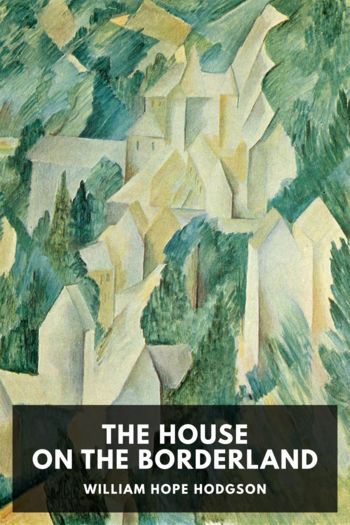The House on the Borderland by William Hope Hodgson (distant reading TXT) 📕

- Author: William Hope Hodgson
Book online «The House on the Borderland by William Hope Hodgson (distant reading TXT) 📕». Author William Hope Hodgson
One day, he had appeared as usual on his customary errand. He had passed through the village without exchanging more than a surly nod with the inhabitants and gone on toward the House. Usually, it was evening before he made the return journey. On this occasion, however, he had reappeared in the village, a few hours later, in an extraordinary state of excitement, and with the astounding information, that the House had disappeared bodily, and that a stupendous pit now yawned in the place where it had stood.
This news, it appears, so excited the curiosity of the villagers, that they overcame their fears, and marched en masse to the place. There, they found everything, just as described by the carrier.
This was all that we could learn. Of the author of the MS., who he was, and whence he came, we shall never know.
His identity is, as he seems to have desired, buried forever.
That same day, we left the lonely village of Kraighten. We have never been there since.
Sometimes, in my dreams, I see that enormous pit, surrounded, as it is, on all sides by wild trees and bushes. And the noise of the water rises upward, and blends—in my sleep—with other and lower noises; while, over all, hangs the eternal shroud of spray.
Grief17Fierce hunger reigns within my breast,
I had not dreamt that this whole world,
Crushed in the hand of God, could yield
Such bitter essence of unrest,
Such pain as Sorrow now hath hurled
Out of its dreadful heart, unsealed!
Each sobbing breath is but a cry,
My heart-strokes knells of agony,
And my whole brain has but one thought
That nevermore through life shall I
(Save in the ache of memory)
Touch hands with thee, who now art naught!
Through the whole void of night I search,
So dumbly crying out to thee;
But thou are not; and night’s vast throne
Becomes an all stupendous church
With star-bells knelling unto me
Who in all space am most alone!
An hungered, to the shore I creep,
Perchance some comfort waits on me
From the old Sea’s eternal heart;
But lo! from all the solemn deep,
Far voices out of mystery
Seem questioning why we are apart!
“Where’er I go I am alone
Who once, through thee, had all the world.
My breast is one whole raging pain
For that which was, and now is flown
Into the Blank where life is hurled
Where all is not, nor is again!”
An apparently unmeaning interpolation. I can find no previous reference in the MS. to this matter. It becomes clearer, however, in the light of succeeding incidents. —Ed. ↩
Here, the writing becomes undecipherable, owing to the damaged condition of this part of the MS. Below I print such fragments as are legible. —Ed. ↩
The severest scrutiny has not enabled me to decipher more of the damaged portion of the MS. It commences to be legible again with the chapter entitled “The Noise in the Night.” —Ed. ↩
The Recluse uses this as an illustration, evidently in the sense of the popular conception of a comet. —Ed. ↩
Evidently referring to something set forth in the missing and mutilated pages. See “Fragments,” Chapter 14. —Ed. ↩
No further mention is made of the moon. From what is said here, it is evident that our satellite had greatly increased its distance from the Earth. Possibly, at a later age it may even have broken loose from our attraction. I cannot but regret that no light is shed on this point. —Ed. ↩
Conceivably, frozen air. —Ed. ↩
See previous note. This would explain the snow (?) within the room. —Ed. ↩
I am confounded that neither here, nor later on, does the Recluse make any further mention of the continued north and south movement (apparent, of course) of the sun from solstice to solstice. —Ed. ↩
At this time the sound-carrying atmosphere must have been either incredibly attenuated, or—more probably—nonexistent. In the light of this, it cannot be supposed that these, or any other, noises would have been apparent to living ears—to hearing, as we, in the material body, understand that sense. —Ed. ↩
I can only suppose that the time of the Earth’s yearly journey had ceased to bear its present relative proportion to the period of the sun’s rotation. —Ed. ↩
A careful reading of the MS. suggests that, either the sun is traveling on an orbit of great eccentricity, or else that it was approaching the green star on a lessening orbit. And at this moment, I conceive it to be finally torn directly from its oblique course, by the gravitational pull of the immense star. —Ed. ↩
It will be noticed here that the Earth was “slowly traversing the tremendous face of the dead sun.” No explanation is given of this, and we must conclude either that the speed of time had slowed, or else that the Earth was actually progressing on its orbit at a rate, slow, when measured by existing standards. A careful study of the MS. however, leads me to conclude that the speed of time had been steadily decreasing for a very considerable period. —Ed. ↩
See this note. ↩
Without doubt, the flame-edged mass of the Dead Central Sun, seen from another dimension. —Ed. ↩
From the unfinished word, it is possible, on the MS., to trace a faint line of ink, which suggests that the pen has trailed away over the paper; possibly, through fright and weakness. —Ed. ↩
These stanzas





Comments (0)